Mystery and Excellence on The Human Body - Ancient Olympics
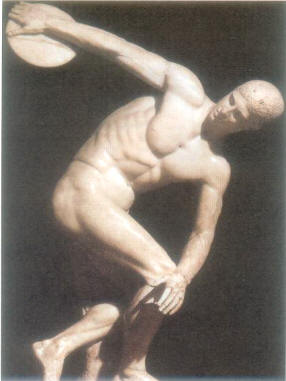
Ancient Olympics
The Greeks loved to play, and they played on a great scale. All over Greece there were games, all sort of games; athletic contests of every description: races — horse-, boat-, foot-, torch races; contests in music, where one side outsung the other; in dancing — on greased skins sometimes to display a nice skill of foot and balance of body; games where men leaped in and out of flying chariots; games so many one grows weary with the list of them. They are embodied in the statues familiar to all, the disc thrower, the charioteer, the wrestling boys, the dancing flute players. The great games — there were four that came at stated seasons — were so important, when one was held, a truce of God was proclaimed so that all Greece might come in safety without fear. There "glorious-limbed youth" — the phrase is Pindar's, the athlete's poet — strove for an honour so coveted as hardly anything else in Greece. An Olympic victor — triumphing generals would give place to him. His crown of wild olives was set beside the prize of the tragedian. Splendour attended him, processions, sacrifices, banquets, songs the greatest poets were glad to write. Thucydides, the brief, the severe, the historian of that bitter time, the fall of Athens, pauses, when one of his personages has conquered in the games, to give the fact full place of honour. If we had no other knowledge of what the Greeks were like, if nothing were left of Greek art and literature, the fact that they were in love with play and played magnificently would be proof enough of how they lived and how they looked at life. Wretched people, toiling people, do not play. Nothing like the Greek games is conceivable in Egypt or Mesopotamia. The life of the Egyptian lies spread out in the mural paintings down to the minutest detail. If fun and sport had played any real part they would be there in some form for us to see. But the Egyptian did not play. "Solon, Solon, you Greeks are all children," said the Egyptian priest to the great Athenian. At any rate, children or not, they enjoyed themselves. They had physical vigour and high spirits and time, too, for fun. The witness
of the games is conclusive. And when Greece died and her reading of the great enigma was buried with her statues, play, too, died out of the world. The brutal, bloody Roman games had nothing to do with the spirit of play.... Play died when Greece died and many and many a century passed before it was resurrected.
Such was the veneration attached to disciplined physical achievement that in the confused chronology of early Hellenic history perhaps the only date which historians can treat as a lodestar in their search is 776 BC. This is called the first fixed date in Greek history, the year in which the Olympic Games were founded in honour of Zeus.
But this was by no means the beginning of Greek athletics. We know from Homer, the author of the two famous epics the Iliad and the Odyssey, that the events of the Games had been practised in the Greek world many centuries before the Trojan War. In the Iliad, right in the middle of that war, the great hero "swift-footed Achilles" organises "funeral" games in honour of his dear friend Patroclus, who has just fallen in battle. Achilles watches all the games and distributes the prizes. Only then does he consider that he has paid a proper tribute to his friend. Athletics were thought the best way of honouring the gods and those striving to surpass them, the "heroes".
Let us turn back to Homer for a moment. The poet of the Iliad had what some misguided people today think the most necessary qualification for the artist: he was class-conscious. He writes only of kings and princes; the ordinary soldier plays no part in the poem. Moreover, these kings and princes are portrayed sharply with all the limitations of their class and time; they are proud, fierce, vengeful, glorying in war though at the same time hating it. How could it happen then that such heroes could become exemplars and a living inspiration to the later bourgeoisie? Because, being Greeks, they could not see themselves in any context but the widest possible, namely as men. Their ideal was not a specifically knightly ideal, like Chivalry or Love: they called it arete — another typically Greek word. When we meet it in Plato we translate it "Virtue' and consequently miss all the flavour of it. 'Virtue', at least in modem English, is almost entirely a moral word; arete on the other hand is used indifferently in all the categories and means simply 'excellence'. It may be limited of course by its context; the arete of a race-horse is
speed, of a cart-horse strength. If it is used, in a general context, of a man it will connote excellence in the ways in which a man can be excel lent — morally, intellectually, physically. Thus the hero of the Odyssey is a great fighter, a wily schemer, a ready speaker, a man of stout heart and broad wisdom who knows that he must endure without too much complaining what the gods send; and he can both build and sail a boat, drive a furrow as straight as anyone, beat a young braggart at throwing the discus, challenge the Phaeacian youth at boxing, wrestling or running; Hay, skin, cut up and cook an ox, and be moved to tears by a song. He is in fact an excellent all-rounder; he has surpassing arete. So too has the hero of the older poem, Achilles — the most formidable of fighters, the swiftest of runners, and the noblest of soul; and Homer tells us, in one notable verse, how Achilles was educated. His father entrusted the lad to old Phoenix, and told Phoenix to train him to be "A maker of speeches and a doer of deeds". The Greek hero tried to combine in him self the virtues which our own heroic age divided between the knight and the churchman.
It is not a point to emphasize, but it does introduce another aspect of this wholeness of mind, one in which the Greeks contrasted sharply with the "barbarians" and with most modem peoples. The sharp distinction which the Christian and the Oriental world has normally drawn between the body and the soul, the physical and the spiritual, was foreign to the Greek — at least until the time of Socrates and Plato. To him there was simply the whole man. That the body is the tomb of the soul is indeed an idea which we meet in certain Greek mystery-religions, and Plato, with his doctrine of immortality, necessarily distinguished sharply between body and soul; but for all that, it is not a typical Greek idea. The Greek made physical training an important part of education, not because he said to himself, 'Look here, we mustn't forget the body', but because it could never occur to him to train anything but the whole man. It was as natural for the polis to have gymnasia as to have a theatre or warships, and they were constantly used by men of all ages, not only for physical but also for mental exercise.
But it is the Games, local and international, which most clearly illustrate this side of the Greek mind. Among us it is sometimes made a reproach that a man "makes a religion of games". The Greek did not do this, but he did something perhaps more surprising: he made games part of his religion. To be quite explicit, the Olympian Games, the
greatest of the four international festivals, were held in honour of Zeus of Olympia, the Pythian Games in honour of Apollo, the Panathenaic Games in honour of Athena. Moreover, they were held in the sacred precinct. The feeling that prompted this was a perfectly natural one. The contest was a means of stimulating and displaying human arete, and this was a worthy offering to the god. In the same way, games were held in honour of a dead hero, as to Patroclus in the lliad. But since arete is of the mind as well as of the body, there was not the slightest incongruity or affection in combining musical contests with athletic; a contest in flute-playing was an original fixture in the Pythian Games — for was not Apollo himself "Lord of the Lyre".
It was arete that the games were designed to test — the arete of the whole man, not a merely specialized skill. The usual events were a sprint, of about 200 yards, the long race (1.5 miles), the race in armour, throwing the discus, and the javelin, the long jump, wrestling, boxing (of a very dangerous kind), and chariot-racing. The great event was the pentathlon: a race, a jump, throwing the discus, and the javelin, and wrestling. If you won this, you were a man. Needless to say, the Marathon race was never heard of until modern times: the Greeks would have regarded it as a monstrosity. As for the skill shown by modem champions in games like golf or billiards, the Greeks would certainly have admired it intensely, and thought it an admirable thing — in a slave, supposing that one had no better use for a slave than to train him in this way. Impossible, he would say, to acquire skill like this and at the same time to live the proper life of a man and a citizen. It is this feeling that underlies Aristotle's remark that a gentleman should be able to play the flute.— but not too well.
The victor in one of the great games was a Man. He was indeed almost something more, a Hero, and was treated as such by his fellow citizens. Public honours were paid him — which might include the grant of dinner in the town-hall at the public expense for the rest of his life (something to off-set the Crown of Wild Olive), and, especially among the Dorians, the custom grew of commissioning a poet-composer to write a solemn choral hymn in his honour, for performance at a banquet or at some religious festival. So it came about that of the two most majestic and serious poets of the early fifth century, Aeschylus and Pindar, the latter is known to us entirely (but for some fragments of other poems) as a writer of victory-odes. A strange idea to us, that a
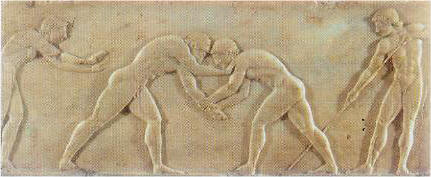
Wrestling contest in the athletic training-ground
serious poet should write odes to athletes. What is more surprising is to find, in such an ode, a passage like this:
He who wins, of a sudden, some noble prize
In the rich years of youth
Is raised high with hope; his manhood takes wings;
He has in his heart what is better than wealth.
But brief is the season of man's delight.
Soon it falls to the ground; some dire decision
uproots it.
— Thing of a day! such is man; a shadow in a dream.
Yet when god-given splendour visits him
A bright radiance plays over him, and how sweet
is life!
The Olympic Games, the most famous of the four great festivals, were open to all Greeks. They were held every four years in a sacred place called Olympia, in honour of Zeus Olympus, king of gods and men. From the beginning the games attracted many visitors.
When the Greeks from the mainland started establishing settlements on the coasts around the Mediterranean Sea, the Olympic Games became the occasion for people scattered over different lands to meet with their compatriots. It was a much awaited "rendezvous" that most Greeks did not want to miss. The Olympic Games were such an important
event in Greek life that people would count time in "Olympiads", the periods of four years between the Games. That was the only common calendar on which all Greeks could agree.
It all started with a ceremony...
For two days the procession had been moving slowly down the sacred way toward Olympia. At the head of the parade were the stem Hellanodicae, the purple-robed judges who would preside over the ancient Olympic Games. They were followed by other officials: referees, umpires, heralds, and trumpeters. Then came the athletes and their trainers, representing most of the city-states throughout the ancient Greek world. There were slim-waisted, long-legged runners; broad shouldered pentathletes, who would compete in five events; and heavy chested, large-limbed wrestlers and boxers. In the rear were sleek race horses and their riders, and colourful chariots drawn by spirited steeds.
The sacred way to Olympia started in Elis, the city-state 34 miles away. The route skirted the low mountains of the western Peloponnesus and followed the curves along the coast line of the Ionian Sea. As the pro cession reached the fountain of Piera, which marked the boundary between Elis and the holy precinct of Olympia, the summer sun was sinking slowly behind the western edge of the sea. A halt was called and the marchers paused for the final rites of purification before setting foot on the sacred soil of Olympia. A pig was sacrificed and cleansing ceremonies were performed with the waters of the fountain. Then the marchers settled down among the olive trees to spend the night. The middle of the month, the time of the full moon, was just three nights away.
At the same time, travellers from all over the ancient Greek world were flocking to the Olympic Games. Some were coming on foot along the coastal road from Athens and Corinth. Others, on horseback and in carriages, crowded the valleys and jammed every road and mountain pass on the Peloponnesian peninsula. Up the Alpheus River came barges on their way from the sea about 10 miles to the west. The vessels carried Greek statesmen and merchant princes, each trying to out shine the other in magnificence. They had travelled all the way from Italy and Sicily, Marseille, the Black Sea, and even from the northern coast of Africa. In all of these places the Greeks had established colonies, and their inhabitants still spoke only Greek and followed faithfully their homeland's customs.
Among the arriving visitors were poets and philosophers, princes and politicians, historians, soldiers, sculptors, and horse breeders. Peasants from Elis and nearby Pisa mingled with fishermen from the coast and offshore islands. With the crowds came herdsmen driving cattle to be sacrificed on the altars, merchants laden down with skins of wine, and fruit vendors. Bundles of lucky charms were being carted in for sale, as well as fillets, or headbands of wool, religious offerings, and wreaths resembling the crown of olives to be awarded each winning Olympic champion. With the peddlers came singers and dancers, gamblers and thieves, bands of clowns, acrobats, and tumblers.
Early the next morning the official procession entered Olympia and the Festival was under way. The athletes, with their trainers, families, and friends, had been in Elis for a month. For thirty days the athletes had been training under the supervision of the Hellanodicae, who were very strict. Any athlete who broke a rule could expect a beating. The contestants, who had to be free Greek sons of free Greek parents, were tested and trained rigorously, and only the best were permitted to compete at Olympia. According to Philostratus (Life of Apollonius), before the chosen athletes had set out on the two-day march to the Games, they had been told by the judges:
If you have practiced hard for Olympia, and if you have not been lazy, or done anything dishonourable, then go forward with confidence. But if any of you have not trained your selves this way, then leave us and go where you choose.
At Olympia the athletes had to go through one final ceremony to reaffirm their eligibility to compete. They stood before a towering statue of Zeus, represented as the god of oaths brandishing a thunderbolt in each hand. The figure was awe-inspiring, a grim warning to anyone who might have been tempted to testify falsely. The athletes, their fathers, brothers, and trainers raised their hands over the entrails of a sacrificed pig and swore a solemn oath. They vowed that they had observed all the rules of training for at least ten months and that they would use no unfair means in order to win at the Games.
After the athletes had finished giving their oath, the judges swore to take no bribes, to make their decisions fairly, and to keep secret the reasons for their judgments. Then the final list of entries was drawn up,
and the order of the preliminary heats written out on a white board. The athletes and their trainers crowded around the board, anxious to see who their opponents would be in the first matches....
There was a sense of peace about the Olympic site. It was, late summer; the early grain harvests had already been gathered, but the grapes were still ripening on the vines and the olives on the trees. It was a good time for the men and youths who worked in the fields and orchards to put down their tools for a while. In years past, the lull after the early harvest had often been filled with the clash of battles between neighbouring city-states, but for the Olympic Games a sacred truce was declared for a period of three months.
During this time of truce all arms were forbidden at Olympia, and safe passage was guaranteed to all competitors and visitors. Yet, old rivalries were not easily forgotten, and the crowds, even as they wandered around after the athletes from their own communities, continued .to eye visitors from rival city-states cautiously. The truce was originally intended to end the fighting on the Peloponnesus between the two rival city-states Elis and Pisa. But as the Greek world spread into Asia, Africa, and Europe, it became necessary to expand the area protected by the truce. Originally the truce lasted for only one month, then it had to be extended for an additional month, then still another, to permit the competitors and spectators time to reach the banks of the Alpheus and return home.
Several months before the Olympic Games were scheduled to begin, three sacred truce bearers of Zeus left Elis and headed east and west to every city-state on the Greek mainland and every Greek community overseas. These heralds were welcomed throughout the states of the Greek-speaking world. With official ceremony, the heralds proclaimed the period of the sacred truce and invited all Greek citizens to come to Olympia....
A visit to Olympia was not the most comfortable of experiences. The roads were poor and there were few accommodations for visitors. Food could be purchased only from booths and stalls, and drinking water was scarce. Until an ornamental fountain was erected in Roman times, there were only nine freshwater sources to supply the thousands of visitors.
Late summer was a time of fierce, scorching heat by day, barely cooled off by the breezes at night. The noise and din of thousands of
people crammed into the altis overpowered the stillness of the sanctuary. Taking baths was a problem, despite moments of sudden, drenching downpours, which soaked visitors to the skin. Conditions were so uncomfortable that one Greek master threatened to punish his disobedient slave by sending him to Olympia to endure all its hardships.
On the other hand, visitors were delighted by the spectacle of the Games. Almost everyone agreed with the Greek satirist Lucian, who told a sceptical visitor from Scythia:
My dear Anacharsis, if it were time for the Olympic Games, or the Isthmian or Panathenaic Games, the events there would themselves teach you that the energy we give to athletics is not wasted. But telling you how delightful the Games are will-not really convince you. You should sit there yourself, among the spectators, and see the fine contestants, how beautiful and healthy their bodies are, their marvellous skill and unbeatable strength, their daring and ambition, their firm resolve and their absolute will to win. I know quite well that you would never stop praising them, clapping and cheering.
And so for five days, 45000 spectators, who had slept in the open under the stars, kept their places in the stadium all day long, despite the heat, the mosquitoes, and the thirst. No women sat among them: women were not allowed to attend the festival.
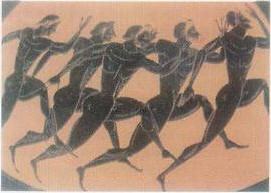
All the contestants as well as their trainers, whatever their age or rank, were naked.
The most important events were grouped together as the pentathlon, or five contests. To promote all-around development in the athlete each entry in any of these events was required to compete in all of them; to secure the victory it was necessary to win three contests out of the five. The first was a broad jump; the athlete held weights like dumbbells in his hands, and leaped from a standing start. Ancient writers assure us that some jumpers spanned fifty feet; but it is not necessary to believe everything that we read. The second event was throwing the discus, a circular plate of metal or stone weighing about twelve pounds; the best throws are said to have covered a hundred feet. The third contest was in hurling the javelin or spear, with the aid of a leather thong attached to the centre of the shaft. The fourth and principal event of the group was the stadium sprint — i.e., for the length of the stadium, usually some two hundred yards. The fifth contest was wrestling. It was a highly popular form of competition in Greece, for the very name palaistra was taken from it, and many a story was told of its champions.
Boxing was an ancient game, almost visibly handed down from Minoan Crete and Mycenaean Greece. The boxers practiced with punching balls hung on a level with the head and filled with fig seeds, meal, or sand. In the classic age of Greece (i.e., the fifth and fourth centuries), they wore "soft gloves" of oxhide dressed with fat and reaching almost to the elbow. Blows were confined to the head, but there was no rule against hitting a man who was down. There were no rests or rounds; the boxers fought till one surrendered or succumbed. They were not classified by weight; any man of any weight might enter the lists. Hence weight was an asset, and boxing degenerated in Greece from a competition in skill into a contest in brawn.
In the course of time, as brutality increased, boxing and wrestling were combined into a new contest called the pankration, or game of all powers. In this everything but biting and eye-gouging was permitted, even to a kick in the stomach. Three heroes whose names have come
down to us won by breaking the fingers of their opponents; another struck so ferociously with straight extended fingers and strong sharp nails that he pierced the flesh of his adversary and dragged out his bowels. Milo of Crotona was a more amiable pugilist. He had developed his strength, we are told, by carrying a calf every day of its life until it was a full-grown bull. People loved him for his tricks: he would hold a pomegranate so fast in his fist that no one could get it from him, and yet the fruit was uninjured; he would stand on an oiled quoit and resist all efforts to dislodge him; he would tie a cord around his fore head and burst the cord by holding his breath and so forcing blood to his head. In the end he was destroyed by his virtues. "For he chanced," says Pausanias, "on a withered tree, into which some wedges had been driven to separate the wood, and he took it into his head to keep the wood apart with his hands. But the wedges slipped out, he was imprisoned in the tree, and became a prey to the wolves."
In addition to the pentathlon sprint, there were other fool; races at the games. One was for four hundred yards, another for twenty-four stadia, or 2 2/3 miles; a third was an armed race, in which each runner carried a heavy shield. We have no knowledge of the records made in these races; the stadium differed in length in different cities, and the Greeks had no instruments for measuring small intervals of time. Stories tell of a Greek runner who could outdistance a hare; of another who raced a horse from Coronea to Thebes (some twenty miles) and beat it; and of how Pheidippides ran from Athens to Sparta — 150 miles — in two days and, at the cost of his life, brought to Athens the news of the victory at Marathon, twenty-four miles away. But there were no "marathon races" in Greece.
In the plain below the stadium Olympia built a special hippodrome for horse races. Women as well as men might enter their horses, and, as now, the prize went to the owner and not to the jockey, though the horse was sometimes rewarded with a statue. The culminating events of the games were the chariot races, with two or four horses running abreast. Often ten four-horse chariots competed together; and as each had to negotiate twenty-three turns around the posts at the ends of the course, accidents were the chief thrill of the game; in one race with forty starters a single chariot finished. We may imagine the tense excitement of the spectators at these contests, their wordy arguments about their favourites, their emotional abandonment as the survivors rounded the last turn.
When the toils of five days were over the victors received their rewards. Each bound a woollen fillet about his head, and upon this the judges placed a crown of wild olive....
Winning in the Olympic Games was believed to be as pleasing to the Doric gods as it was to the princes and spectators assembled to watch the events. Unfairness and corruption were deemed displeasing to the gods; it was considered a sacrilege to violate the rules of the game. A strong bond linked every Greek athlete with his gods, to whom he believed he owed his success. Early competition in Greece was quite free of corruption, particularly at Olympia.
Sculptors made bronze or stone statues of the victor. The physical perfection of the all-round athlete generated the ideal of Greek statuary. The festival gave the sculptor unequalled opportunities to study the nude human body in every natural form and pose. Poets wrote odes in honour of the victor, and these were sung by choruses of boys in the procession that welcomed him home. So the winning athlete was immortalized in statues and poems; his excellence had made him worthy of being among the gods.
Greece lost its freedom when it was made part of a Roman province in 146 BC. The Olympic Games, however, went on without interruption. Roman aristocrats and athletes now came across the seas to compete with Greek athletes in the ancient Games. But when the Roman Emperors converted to Christianity, the Games lost their patronage. An edict of the Emperor Theodosus I, in AD 393, closed all "pagan" shrines. Zeus the Thunderer and all the other gods of Mount Olympus were banished. The last Olympiad, the 293rd, was probably held that same year.
Olympia lay buried in mud for about 1,400 years. Early in the nineteenth century, archaeologists began to explore the remains of the temple of Zeus, and they have been digging in the area ever since.
A French nobleman. Baron Pierre de Coubertin, envisioned a modern revival of the ancient games, and he spent many years appealing for support from the nations of the world. In 1896 he finally was able to restage the Games for the first time in fourteen centuries. Now every four years a "priestess " lights an Olympic flame from the light of the sun, enters the stadium in Olympia, and hands the torch to a priestly "king" of the new Olympiad. He passes the torch to the leader of a team of runners, who usher it out of the altis to a grove dedicated to
Baron de Coubertin. There an urn is lit on a modern altar, where it burns for the entire duration of the Games.
Another torch, lit from the urn on the altar, is carried by relays of runners until the Olympic flame has reached a temporary home, wherever in the world the Games are about to take place.
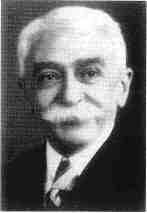
____________________________
Essay based on extracts from H.D.F.
Kitto, The Greeks,
Penguin Books, London,
and from Edith Hamilton,
The Greek Way,
Norton and Company, New York
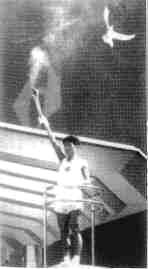
The Olympic flame, Seoul, 1988
Related Books
- Alexander the Great
- Arguments for The Existence of God
- But it is done
- Catherine The Great
- Danton
- Episodes from Raghuvamsham of Kalidasa
- Gods and The World
- Homer and The Iliad - Sri Aurobindo and Ilion
- Indian Institute of Teacher Education
- Joan of Arc
- Lenin
- Leonardo Da Vinci
- Lincoln Idealist and Pragmatist
- Marie Sklodowska Curie
- Mystery and Excellence on The Human Body
- Nachiketas
- Nala and Damayanti
- Napoleon
- Parvati's Tapasya
- Science and Spirituality
- Socrates
- Sri Krishna in Brindavan
- Sri Rama
- Svapnavasavadattam
- Taittiriya Upanishad
- The Aim of Life
- The Crucifixion
- The Good Teacher and The Good Pupil
- The Power of Love
- The Siege of Troy
- Uniting Men - Jean Monnet